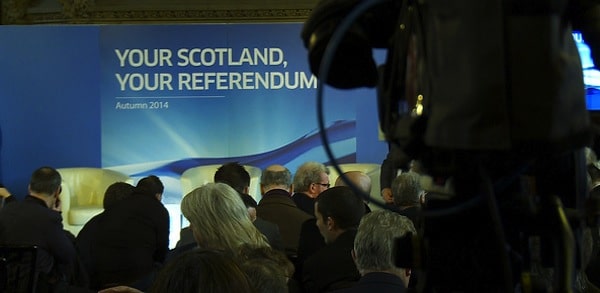
Scotland’s independence movement is different from others in Europe. The country’s leader and First Minister, Alex Salmond, has always made a point of distancing himself from debates on ethnicity and national identity. Hence, he recoils from any comparisons with Catalonia or other cases. For Scotland he wants, first and foremost, a social model that is closer to Denmark’s than to England’s. Despite a strong whiff of the ‘promised land’, the debate is largely on the model of society that is wanted. Scottish society is poorer than England’s, and this is a further difference with other nationalisms, which are usually strong in the richer areas or regions of a country. Additionally, Scotland has had no problem with calling itself a nation, even having its own sports teams and a (Presbyterian) Church that is separate from England’s (Anglican) Church. So it is not a matter of names but rather of forms of governance.
Next 18 September Scotland will be going to the polls to vote on a very clear question: ‘Should Scotland be an independent country’. The ‘Noes’ started off strong but have lost ground to their opponents, although they are still ahead. A sixth of the eligible voters –including, for the first time, the over-16s, who are barred from general elections– are still undecided.
It could be said that it was Margaret Thatcher who was ultimately responsible for encouraging the Scottish independence movement by cutting down the Welfare State and privatising State enterprises, thereby ensuring that the Tories were swept away from their Scottish seats. Later on it was the Blairites who took the blow, despite the fact that it was Blair who brought devolution. Scotland saved a portion of its model with devolution, but it is seeking to regain even more. Scottish universities are not subject to the exorbitant fees paid in England, and it is only the English, Welsh and Northern Irish who must pay to study in Scotland, unlike other Europeans, since according to EU law they cannot be discriminated against. Also unlike England, prescription medicines in the public health system are free of charge, as is aid to the elderly.
The Scottish independence movement has to do a lot with compassion, empowerment and equal opportunities in education, as Salmond himself has stressed. Jonathan Freeland, a Guardian columnist, recently explained it well in a long and documented article –from which derive some of the data mentioned in this commentary– that pointed out that Scotland had wanted to move away from the ‘turbo capitalism of the City of London’. He observed that the Scottish government’s lengthy white paper on Scotland’s Future, in its Q & A section –the third, after one on whether Scotland should be independent and another on whether it can afford to be– deals with ‘What will happen to my pension?’. And he quotes the playwright David Greig, for whom ‘the Scotland we’re willing to be born is a new kind of country, not that nineteenth-century kind of state’.
Thus, Scottish nationalism is in many ways the search of a small country (whose population of 5.3 million contrasts with the UK’s 63 million) for a Nordic-style social democracy. Of course, Scottish separatists are sure that they can finance their model without receiving any money from the British budget, mainly through North Sea oil and gas, of which they claim to own 90%. This is not London’s view and the issue is likely to be one of the thorniest to negotiate in the event of independence.
There is a political paradox: if Scotland becomes independent it will no longer send 59 MPs to the House of Commons. This will reduce the number of Labour MPs, thus making it not only difficult for Labour to win British elections but also to defend a UK-wide Welfare State. In fact, it is the latter issue that Labour has chosen to focus on in its campaign against independence, in a referendum with which it has had little to do and in which the Conservative Prime Minister, David Cameron, has also seen a chance to weaken his traditional rivals.
It is also a ‘peculiar’ independence movement in another respect, because Alex Salmond wants to retain Sterling and will not even balk at maintaining Queen Elisabeth II as the head of the new Scottish State. And, of course, he also wants Scotland to remain within, or to immediately re-join, the EU.
In all this, and despite the transparency of the question posed in the referendum, there is a trap. If, as Salmond requested but Cameron refused, there were the possibility of a third option between ‘Yes’ and ‘No’ –greater devolution than at present– it would probably sweep the board. If the ‘Noes’ prevail, this will probably happen anyway, Salmond or no Salmond.


